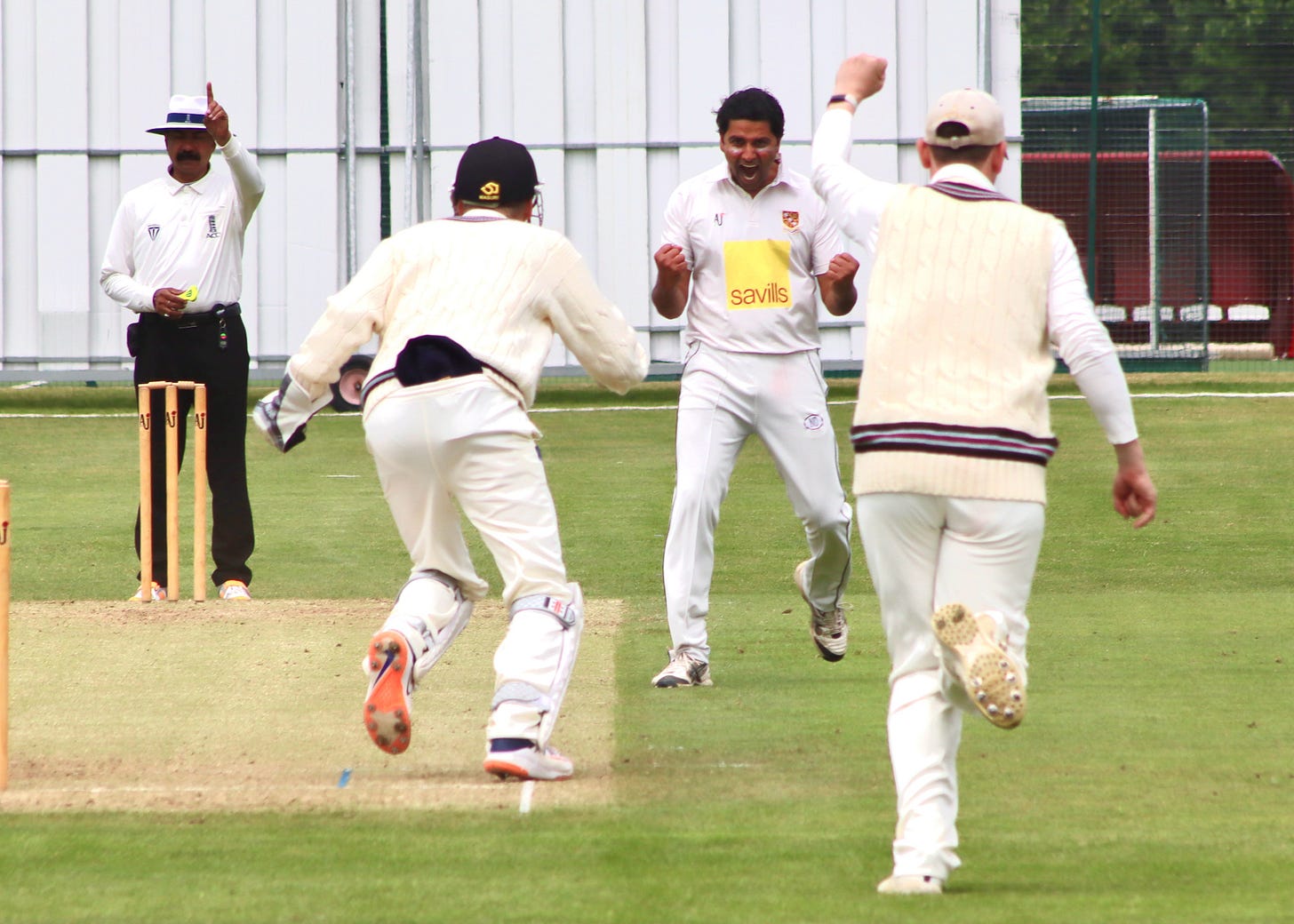To fall in love with failure
No one gets cricket, not least the people who play it.
Cricket is horrible. A game of failure. It’s widely considered to be one of the worst sports in the world for mental health. Success is rare, perfection impossible, and the time to ruminate over mistakes infinite. I’ve played every week since I was eight.
No one gets cricket. Not least the people who play it. In England, it’s a small sport but a national one. A niche passion project where those who like it, love it. And those who don’t, look on with bemusement. Warhammer for the co-ordinated. Globally, the joke at cricket’s expense is that it takes too long. Five days for a draw. And even at the amateur level, where matches are played on a Saturday, they take all of a Saturday. Every cricketer, whatever standard they play, will explain multiple times a season that, “No, they will not be attending your birthday, because they’re playing cricket”. New relationships that flicker in April come with the caveat that the next free weekend will be in September. And for what?
“That feeling of getting out,” reminisces Zafar Ansari. Now 33, he made headlines when he walked away from the sport as a 25-year-old, just months after making his international debut for England. “I can still remember it. Just feeling like…like an idiot. It’s so connected with humiliation and embarrassment. I can’t separate it from that.”
To be fair, I did say cricket was horrible.
The concept of time and team are at the root of why cricket drives people to such despair. Cricket is a team sport that relies heavily on individualised skill, making it unique among sports. You may be out there as an eleven, but when you are batting it’s just you against one bowler. And when you are bowling, it’s just you against one batter. It’s confrontational. Win, and you are the toast of your teammates. Lose, and you are the cause of not only your own disappointment, but theirs. People often point to the horrible pressures a goalkeeper faces in football. An individual resting their team’s performance on their own shoulders. In cricket, we’re all goalkeepers.
Cricket has not been studied widely in academia, but where it has, the evidence lines up. It is the time we spend doing it that causes such angst. You spend your life playing it. You miss social events to do so. And via your absence, your friends know you as “the cricketer”. You’re defined by it. But at a personal level you know it is something you fail at. God forbid they ever came and watched.
At the amateur level, a batting innings lasts around three hours. If you get out at the beginning, your turn is done and you sit on the edge and think. Rarely is a dismissal the result of being outplayed. Instead, it comes from a moment of madness that leads to hours of it. If you are fielding, you can drop a catch and then watch on as that batter scores dozens more runs, each one a growing quantifiable acknowledgement of your mistake. “Time for rumination is a unique psychological challenge in cricket,” explains sports psychologist Chris Marshall, who has worked across various top level sports. “This idea that errors can be exacerbated.”
One of the few academic studies on this subject reported that 37% of professional cricketers in South Africa say they suffered from anxiety or depression. Another, five years later, analysed the same population and placed the figure at 59%. General population figures in South Africa are hard to find but, by way of comparison, the NHS in the United Kingdom reports that 20% of adults have a mental health condition.
“You make one mistake,” explains Marshall. “And your game can be over. You can’t hide. In that moment, it is on you.”
“I played a lot of rugby growing up,” Ansari says. “And I was good. Probably not good enough to play professionally but I was playing at a decent level. And it never felt anything like how cricket felt on a bad day.”
The statistics show that a batter will fail to make their “average” score two out of every three times they walk to the middle. A bowler will only take a wicket once every 40 or so balls they bowl. And those are the good ones.
“There was a sense of it’s so difficult to work out how good you are because of the inconsistency of performance,” explains Ansari. “And that variation in your own perceived level of skill was quite disconcerting. You would go from feeling amazing, to feeling… And it was in a way the reason I stopped… but in the last innings I played, it just felt so bad. I got three off 30 balls and it was just rubbish. And it was a case of how can I be this bad? How can I have just played for England and yet I’m still this bad?”
Time on task defines a personality, leading to cricketers of all standards struggling to untangle themselves from their passion. “It is really important that your self-worth is not dictated by the outcome of what you do,” explains Marshall. “I tend to find the players that have multiple identities—so they’re a cricketer, but they’re also a great partner, or friend, or learning a new skill outside the sport—have more things they can lean on. It’s when people are 100% cricket that it becomes more of a challenge.” Zafar Ansari had multiple identities. As well as cricket, he graduated with a double-first from Cambridge University. His Master’s thesis was on the Deacons for Defense and Justice, a black civil rights group from the 1960s. When he announced his retirement, it came as a shock to everyone, except those who knew him. “Zafar would be reading books in the changing room,” said the head coach of his professional team at the time. “The rest would be colouring them in.” After retiring, Ansari worked as a youth advocate for the charity Just for Kids Law. He volunteered for the Refugee Council, and now he’s a lawyer.
Of whether he regrets his decision? Ansari is clear that he doesn’t. He misses the best bits, such as walking off in front of 25,000 people after a win. But he doesn’t miss the life that led to those moments. “It was the mismatch between the intensity of that feeling [of failure] and the knowledge of ‘it just wasn’t worth it’. It was just a game of cricket.”
But while time may be cricket’s greatest vice, it is also its greatest virtue. Delivering the sport’s sweetest rewards after a day of emotional and physical investment.
There’s a joke about cricket, that the best bit is when you’re not playing. It’s almost true. Because, like many uncomfortable things, the best bit is having done it. The days are long. So while each Saturday is spent away from your non-cricketing friends, they’re instead spent with your people. A group of eleven similarly minded maniacs ready to survive the horror together, then celebrate afterwards. It does, on very rare occasions, go as badly as you fear. You remember those days. They’re burned into your mind. Old Ruts 2015 and Ashtead 2021 for me. There was also one this year, but I’m not ready to commit that to print yet.
But mostly, while you may fail individually, winning or losing is the team’s shared experience. One that ends with everyone perched on the outfield with a drink, the sun setting and tales of the day being traded. Slowly across the evening, your club mates who have played in other matches at different venues across the county will drift back to base and the whole conversation starts again. Who did well, who did what, did you hear about so-and-so’s dropped catch? That was funny.
At its best, it is wonderful. At its worst, it can hurt. And even at its most mundane, it’s still a family. And that’s what keeps us coming back.
I have a game this weekend. History suggests it won’t go well.
Cameron Ponsonby is a journalist based in London. He likes cricket.







Cameron one of those few modern sports pundits to link the dream of the professionals with the relatable experiences of myself!
Love this. I’ve wasted years of my life on this stupid game and can’t wait to do it all again next year. No other sport has the sudden and rage inducing end.